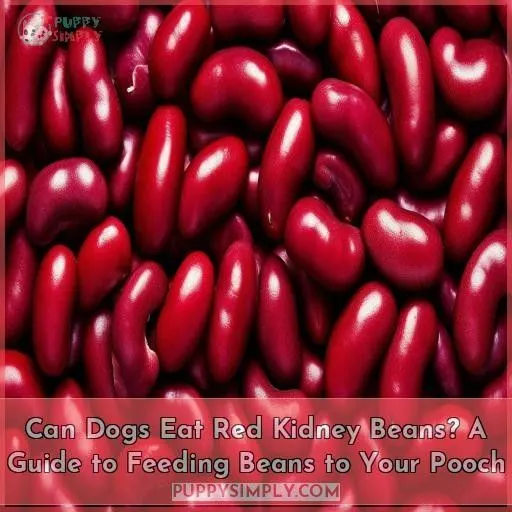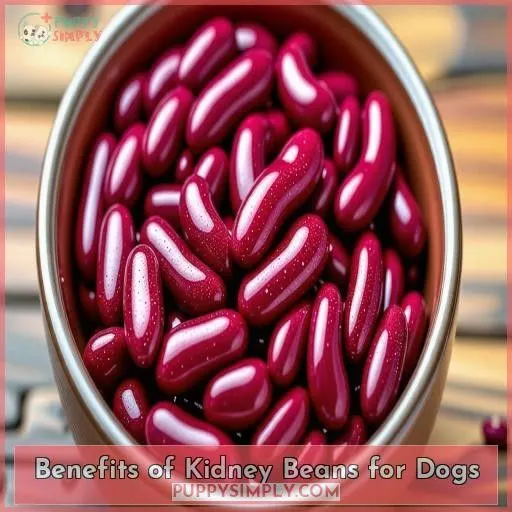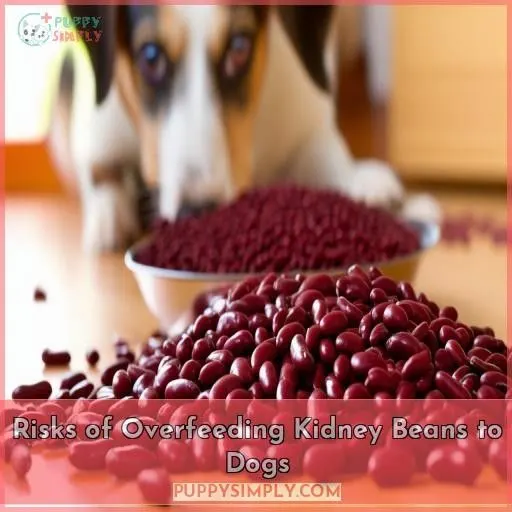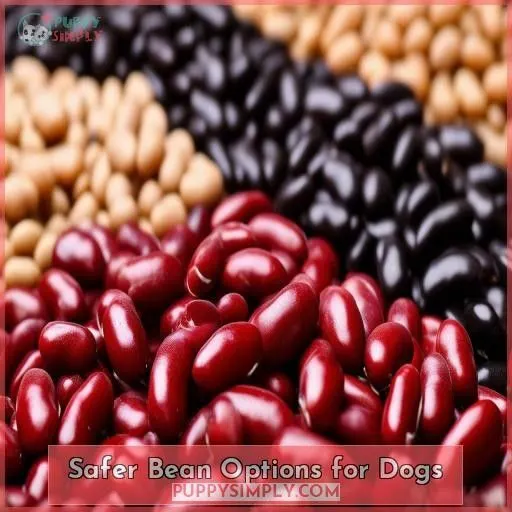This site is supported by our readers. We may earn a commission, at no cost to you, if you purchase through links.

Soak dried beans overnight to remove lectins.
Then boil for 30+ minutes and simmer for 45-60 minutes to deactivate remaining toxins.
Serve plain, cooked kidney beans in moderation—high fiber can cause gas and digestive issues if overfed.
These nutrient-dense legumes offer protein, fiber, vitamins, minerals, and antioxidants beneficial for your pup’s health.
Just make certain thorough cooking and introduce gradually to avoid tummy troubles.
For more details on safely incorporating kidney beans into Fido’s diet, keep reading.
Table Of Contents
- Key Takeaways
- Can Dogs Eat Red Kidney Beans?
- Are Kidney Beans Safe for Dogs?
- How to Prepare Kidney Beans for Dogs
- Benefits of Kidney Beans for Dogs
- Risks of Overfeeding Kidney Beans to Dogs
- Safer Bean Options for Dogs
- Frequently Asked Questions (FAQs)
- Can dogs eat canned red kidney beans?
- Are any beans toxic to dogs?
- Are canned red kidney beans safe?
- Can dogs eat red kidney beans and rice?
- Can dogs eat raw kidney beans?
- How much kidney beans can dogs eat?
- Are canned kidney beans safe for dogs?
- What are the signs of kidney bean toxicity in dogs?
- Can kidney beans cause pancreatitis in dogs?
- Conclusion
Key Takeaways
- Proper preparation is the name of the game when it comes to feeding your pup kidney beans. Soaking them overnight and thoroughly cooking them is a must to neutralize those pesky toxins that could send your furry friend on a one-way trip to Upset Tummy Town.
- While kidney beans pack a protein-y punch, moderation is key to avoiding any potential digestive dramas. Think of them as a treat, not the main course, and your dog’s belly will thank you for it.
- Canned kidney beans? Sorry, Fido, that’s a no-go. The sodium and preservatives in those little cans are a recipe for disaster, like a full-blown sodium overload in your pup’s system. Stick to the dried variety and cook them up fresh for a safer snack.
- If your dog starts acting like they just auditioned for a remake of The Exorcist after chowing down on some kidney beans, it’s a surefire sign that you need to dial back on the portion sizes or give those legumes a break altogether. Trust me, you don’t want to witness the aftermath of a bean-induced doggy meltdown.
Can Dogs Eat Red Kidney Beans?
Yes, dogs can eat red kidney beans, but only if they’re thoroughly cooked and served in moderation. However, it’s crucial to be aware of the risks of overfeeding and take necessary precautions. (Source)
Are Kidney Beans Safe for Dogs?
While cooked kidney beans can be a healthy treat for dogs in moderation, you should avoid feeding your pup canned kidney beans as they tend to be high in sodium and preservatives. Take care to properly prepare dried kidney beans by soaking them overnight to remove lectins and cooking them thoroughly.
Cooked Kidney Beans Are Safe for Dogs in Moderation
Regarding feeding your dog cooked kidney beans, moderation is crucial to prevent potential digestive issues. Here’s what to keep in mind:
- Moderation is Essential: Offer cooked kidney beans to your dog in controlled portions to avoid digestive upset.
- Homemade Treats: Incorporate cooked kidney beans into homemade dog treats for added nutritional benefits.
- Nutritional Enhancements: Use cooked kidney beans as a nutritional supplement to your dog’s diet.
- Dietary Alternatives: Consider cooked kidney beans as an alternative ingredient in your dog’s meals.
Canned Kidney Beans Are High in Sodium and Preservatives
While canned kidney beans are convenient, they often contain high amounts of sodium and preservatives that can be harmful to your dog’s health. Opt for dried kidney beans instead and prepare them by soaking overnight and cooking thoroughly. Avoid feeding canned kidney beans regularly, as the sodium can lead to serious long-term issues like high blood pressure and kidney problems.
How to Prepare Kidney Beans for Dogs
To prepare kidney beans for your dog, you’ll need to soak dried beans overnight to remove harmful lectins, then cook them thoroughly to deactivate any remaining toxins. When cooking, avoid adding seasonings, salt, or other ingredients; serve the plain, cooked kidney beans to guarantee safety.
Soak Dried Beans Overnight to Remove Lectins
To safely prepare kidney beans for your pup, soak dried beans overnight. This simple step aids in removing harmful lectins, making them more digestible for your dog. Soaking beans for at least 8 hours is essential to lowering lectin levels. Canned beans may be convenient, but dried beans offer greater control over ingredients and sodium content.
- Soak dried beans overnight for at least 8 hours
- Soaking facilitates the removal of harmful lectins
- Canned beans contain elevated levels of sodium and preservatives
- Dried beans enable you to manage ingredients
- Soaking is a fundamental first step in preparing beans
Cook Thoroughly to Deactivate Remaining Lectins
After soaking overnight, cook dried kidney beans thoroughly to deactivate any remaining lectins. Boil for at least 30 minutes, then simmer for 45-60 minutes until soft. Drain and rinse the cooked beans before serving. Introduce beans slowly and monitor for digestive upset or potential allergies. Consult your vet before making significant dietary changes.
| Soaking Duration | Lectin Deactivation | Cooking Method | Safe Serving Size |
|---|---|---|---|
| Overnight | Boil 30+ minutes | Simmer 45-60 min | Start small |
Avoid Adding Seasonings, Salt, or Other Ingredients
When preparing kidney beans for dogs, it’s essential to avoid adding seasonings, salt, or other ingredients.
Seasonings and salt can cause digestive sensitivities. Additional ingredients may not be suitable for your dog’s nutritional needs.
Furthermore, spices can be disruptive. Excessive sodium content may lead to health issues.
To ensure your dog’s safety, it’s best to serve plain, cooked kidney beans. This controls lectin toxicity and sodium intake while providing essential nutrients like antioxidants and vitamins.
Serve Plain, Cooked Kidney Beans
When serving kidney beans to your dog, always offer plain, thoroughly cooked beans. Avoid adding any seasonings, salt, or other ingredients that could upset your pup’s digestive system. Stick to a simple bean mash, kidney stew, or bean salad topping. Introduce beans gradually and monitor for any gastrointestinal issues. With proper preparation, cooked kidney beans can be a healthy addition to your dog’s diet.
- Serve plain, cooked kidney beans
- Avoid adding seasonings or salt
- Monitor for digestive upset when introducing beans
Benefits of Kidney Beans for Dogs
Kidney beans are an excellent source of protein and fiber for your furry friend. They’re also packed with vitamins A, C, and K, as well as minerals like iron, magnesium, and potassium, while being low in fat and high in antioxidants.
Rich in Protein and Fiber
Kidney beans are a great source of protein and fiber for your pup. With 7.6g of protein and 6.4g of fiber per cup, they provide essential nutrients to keep your dog healthy and energized (Source). However, be mindful of portion sizes to avoid digestive upset. Stick to plain, cooked kidney beans and avoid canned, baked, or refried varieties high in sodium, sugars, and preservatives .
| Nutrient | Kidney Beans (per cup) | Chicken (per cup) |
|---|---|---|
| Protein | 7.6g | 38.8g |
| Fiber | 6.4g | 0g |
| Fat | 0.5g | 7.4g |
| Carbs | 20.4g | 0g |
Packed With Vitamins A, C, and K
Kidney beans are packed with essential vitamins A, C, and K, which offer numerous benefits for your canine companion.
Vitamin A supports healthy vision, skin, and immune function.
Vitamin C boosts collagen production for strong joints and connective tissues.
Vitamin K plays an important role in blood clotting and bone health.
Incorporate cooked kidney beans into your dog’s diet for a nutritional boost, but always consult with your veterinarian first.
Contains Minerals Like Iron, Magnesium, and Potassium
Kidney beans are packed with essential minerals like iron, magnesium, and potassium. Iron supports healthy red blood cells, magnesium aids hormone production, and potassium maintains strong muscles and bones. These minerals work together to promote overall well-being. Incorporate kidney beans into your dog’s diet for a mineral boost and improved heart health.
Low in Fat and High in Antioxidants
When addressing the advantages of kidney beans for canines, it’s worth noting that they possess a low fat content and a high concentration of antioxidants.
These attributes contribute to their potential to promote cardiovascular and ocular health, bolster the immune system, and assist in preserving muscular integrity.
Furthermore, other beans that are safe for dogs include chickpeas, butter beans, pinto beans, and soybeans.
Conversely, dogs should refrain from consuming chili beans due to their potential adverse effects.
Risks of Overfeeding Kidney Beans to Dogs
While kidney beans can provide valuable nutrients for dogs, overfeeding them can lead to unpleasant side effects. Consuming too many kidney beans may cause gas, flatulence, bloating, gastrointestinal upset, diarrhea, or vomiting in dogs.
Gas and Flatulence
Overfeeding kidney beans to dogs can lead to gas and flatulence, causing discomfort for your pet. This may result in gastrointestinal distress, leading to abdominal pain and discomfort. To prevent these issues, always feed beans, including kidney beans, in moderation and follow the proper preparation methods to make sure the safety of your dog’s digestion (Source).
To mitigate the risk of gastrointestinal upset from kidney beans, consider the following:
- Feed in moderation
- Make sure thorough cooking
- Monitor your dog for any signs of discomfort .
Bloating
Bloating can occur when overfeeding kidney beans to your pup. This uncomfortable condition results from excess gas buildup in the digestive tract. Symptoms include a swollen belly, loss of appetite, and weight gain. Consult your vet if bloating persists, as it may indicate an underlying health issue like heart conditions. Moderation is key when adding kidney beans to your dog’s diet.
| Symptom | Cause | Solution |
|---|---|---|
| Bloating | Excess gas buildup | Reduce bean intake, consult vet |
| Loss of appetite | Discomfort from bloating | Smaller, more frequent meals |
| Weight gain | Overeating due to bloating | Adjust calorie intake, exercise |
| Heart conditions | Underlying health issue | Seek veterinary care |
Gastrointestinal Upset
When feeding your dog kidney beans, be cautious to prevent gastrointestinal upset.
Overfeeding can lead to issues like gas, bloating, and stomach discomfort due to lectins and higher fiber content present in kidney beans.
Always make sure you’re cooking kidney beans thoroughly to reduce lectin levels and decrease the risk of adverse effects.
Opt for safe alternatives like cooked green beans or black beans to avoid complications.
Diarrhea
Diarrhea can occur if you overfeed kidney beans to your dog.
The high fiber content may cause digestive upset, leading to loose stools.
Severe diarrhea can lead to dehydration and electrolyte imbalances.
If your dog experiences persistent diarrhea after eating kidney beans, consult your veterinarian.
Pumpkin puree may help firm up stools, but avoid pumpkin pie filling, seeds, spices, or soup, as they may contain ingredients harmful to dogs.
Vomiting
Overfeeding kidney beans to your dog can lead to vomiting, a sign of toxicity. Lectin, a compound in raw beans, causes gastrointestinal distress. If your pup consumes raw kidney beans, contact your vet immediately. Symptoms include:
- Vomiting
- Diarrhea
- Abdominal pain
- Bloating
- Flatulence
Stick to safe, cooked beans in moderation to keep your furry friend happy and healthy.
Safer Bean Options for Dogs
While kidney beans can be safely fed to dogs in moderation when properly cooked, safer bean options include green beans, black beans, lima beans, pinto beans, and garbanzo beans. These beans are generally lower in potential toxins and easier for dogs to digest, providing a nutritious source of plant-based protein and fiber.
Green Beans
Green beans are a safe and beneficial option for dogs.
They’re rich in fiber, vitamins, and antioxidants, contributing to overall health.
Incorporating green beans into your dog’s diet can provide essential nutrients for their well-being, supporting digestive health and overall nutrition.
As part of a balanced diet, green beans can be a valuable addition to ensure your dog’s safety and ability to enjoy a variety of healthy foods.
Black Beans
Black beans are a safe and nutritious option for dogs when cooked thoroughly. They provide fiber, protein, and antioxidants. Introduce black beans gradually, starting with small amounts, and monitor for digestive upset. Avoid adding seasonings, salt, or other ingredients. Black bean recipes, treats, and dips can be a tasty way to incorporate this legume into your dog’s diet.
Lima Beans
Lima beans, also known as butter beans, are a safe and nutritious option for dogs. They’re rich in protein, fiber, and vitamins. To prepare, soak dried beans overnight, then cook thoroughly. Serve plain, without seasonings. Lima beans can be mixed with plain canned pumpkin for a tasty and healthy treat.
Pinto Beans
Pinto beans are a safe and nutritious option for dogs when fed in moderation. They provide fiber, protein, and essential vitamins and minerals. However, introduce them gradually and monitor for digestive upset. Avoid canned varieties high in sodium. Cooked pinto beans pair well with meat and pumpkin in homemade dog food or as a topping.
- Excellent source of fiber and protein
- Packed with vitamins and minerals
- Introduce slowly to avoid digestive issues
Garbanzo Beans
Garbanzo beans, often called chickpeas, are a safe option for dogs.
They provide plant-based protein, fiber, vitamins, and minerals.
Like other beans, they need to be thoroughly cooked and served plain without any seasonings.
Garbanzo bean supplements may not be necessary due to the potential for garbanzo bean allergies in some dogs.
It’s important to monitor for any garbanzo bean side effects and ensure proper garbanzo bean storage to maintain their nutritional value .
Frequently Asked Questions (FAQs)
Can dogs eat canned red kidney beans?
A juxtaposition: While packed with protein, canned red kidney beans are unsafe for dogs due to high sodium levels that can lead to health issues. Opt for fresh, cooked beans instead for a nutritious treat.
Are any beans toxic to dogs?
Yes, some beans can be toxic to dogs if not properly cooked. Raw kidney beans contain lectins that may cause vomiting, diarrhea, and other digestive issues if consumed.
Are canned red kidney beans safe?
While not exactly health food, the occasional canned kidney bean won’t harm your pup – just rinse thoroughly to remove excess sodium. However, stick to plain varieties without spices or added sugars for a safe, fiber-rich treat.
Can dogs eat red kidney beans and rice?
Yes, dogs can eat cooked kidney beans and rice in moderation. Cook thoroughly to remove toxins and avoid spices or seasonings. Introduce new foods slowly and watch for digestive issues. Consult your vet for appropriate portions based on your dog’s needs.
Can dogs eat raw kidney beans?
You should never feed your dog raw kidney beans. They contain toxic lectins that can severely upset their stomach, causing vomiting and diarrhea. Always cook kidney beans thoroughly to deactivate the lectins before serving them to your furry friend.
How much kidney beans can dogs eat?
You should limit kidney beans to 10% of your dog’s daily diet. Feed cooked beans only; raw ones are toxic due to lectins. Start small portions and monitor for digestive upset.
Are canned kidney beans safe for dogs?
Oh, the irony of feeding Fido canned kidney beans! While convenient, they’re a salty, preservative-laden minefield for your pup’s health. Stick to plain, cooked dried beans for a safe, nutritious treat.
What are the signs of kidney bean toxicity in dogs?
If your pup ingests raw kidney beans, watch for vomiting, diarrhea, and abdominal pain—clear signs of lectin toxicity. Cooking deactivates the toxin, but consuming uncooked beans can be hazardous. If symptoms arise, contact your vet immediately for guidance.
Can kidney beans cause pancreatitis in dogs?
Yes, kidney beans can potentially cause pancreatitis in dogs if consumed in large amounts. The high protein and fat content can tax their pancreas, leading to inflammation and digestive issues. Feeding them plain, cooked kidney beans in moderation is best to avoid pancreatitis.
Conclusion
While red kidney beans offer nutritional benefits, they must be properly prepared to avoid toxicity.
Think of your pup’s sensitive stomach after eating undercooked beans—not a pleasant experience!
By thoroughly cooking and introducing red kidney beans gradually, you can safely incorporate this protein-packed legume into your dog’s diet.
However, monitor portion sizes to prevent gastrointestinal discomfort from excessive fiber intake.
With care, kidney beans can be a healthy treat for your furry friend.












